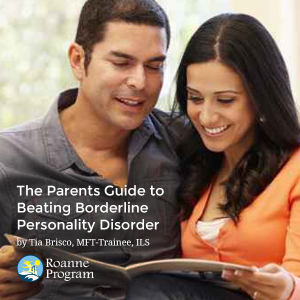The Parents’ Guide to Beating BPD
 “I just felt like giving up. I felt like she hated me one day and loved me without limits the next,” Kaylen C. accounts about her youngest daughter. Kaylen’s daughter had been diagnosed with Borderline Personality Disorder (BPD) on her nineteenth birthday. For families dealing with a BPD diagnosis, this feeling is all too familiar. The constant waves of intense feeling and acts can leave anyone feeling helpless and hopeless.
“I just felt like giving up. I felt like she hated me one day and loved me without limits the next,” Kaylen C. accounts about her youngest daughter. Kaylen’s daughter had been diagnosed with Borderline Personality Disorder (BPD) on her nineteenth birthday. For families dealing with a BPD diagnosis, this feeling is all too familiar. The constant waves of intense feeling and acts can leave anyone feeling helpless and hopeless.
As Borderline Personality Disorder awareness begins to emerge, one can only wonder how such symptoms affect the parental structure. Many families impacted by BPD often find themselves feeling guilty, hopeless, exhausted, tired, ashamed, and confused. Not to mention, there is the impact of seeing their child involve themselves in self-destructive behaviors. In studying parental feelings towards BPD, many parents report two main areas of difficulty, Guilt and Boundaries:
Guilt: While all families who are impacted by mental health hold some form of guilt, parents impacted by BPD report more internalized guilt. Feelings of guilt are usually associated with the fluidity of emotions expressed by a child diagnosed with BPD. For example, Kaylen’s daughter would present extremely angry when Kaylen would leave for a work conference, thus forcing Kaylen to internalize those feelings in a way that she is being a “bad mother for working.” Oftentimes guilt leads to the unconscious promotion of negative borderline behaviors, thus making the behaviors appear more frequently.
Boundaries: For parents, boundaries are considerably difficult to have with children. As a parent whose child has been diagnosed BPD, holding a boundary may appear to be the most difficult aspect of the diagnosis. Since BPD is often categorized by self-destructive behaviors, many parents have the consistent fear of their child seriously harming themselves. As parents, the feeling of protection is innate and sometimes uncontrollable. The impact of the behavior weighs heavily on the parent-child relationship
The Parents Guide to Beating BPD
As a parent what can you do to support your child that is currently impacted by BPD?
Support within limitations. If there is suspicion that your child may have BPD, seeking supportive therapy is key to success. Supporting your child in seeking treatment and reminding them that you are in this together can be the foundation of beating BPD. In doing so, keep yourself abreast on the trends that arise in regards to BPD education and research.
Next, holding strong on boundaries, even when it is difficult to handle. As a parent it is important to communicate these boundaries with not only your child, but the entire family. Having support provides a strong structure to which treatment can prove to be more effective. Seeking your own parental support allow parents to develop concrete boundaries and manage their own emotional reactions.
Finally always remember: You are not built to be your child’s therapist, life coach, or teacher. You are built to be a parent, in that providing love, encouragement, and unconditional support.
At OPI Intensive for young adults with Borderline Personality Disorder and BPD traits, we intensively integrate DBT as part of your treatment plan. We offer compassionate, clinically sophisticated intensive residential help, including genetic testing to determine the best course for medications, if needed. Rather than a sterile, hospital-like environment, we offer beautiful accommodations in luxury apartments just outside of Los Angeles. At OPI Intensive, we treat the individual, not the diagnosis. Our clinical team is made up of a diverse community of passionate, highly skilled individuals working together with you to help you find your joy and express it. For more information on OPI Intensive residential programs and our measures to help young adults with Borderline Personality Disorder, call us at 866-661-3982 or click HERE to submit an online form. We’ll be in touch promptly.
